What Ross Verlag meant for Germany, Iris Verlag did for Austria. Iris was a very popular and internationally known publishing company specialized in film star postcards. It operated from Vienna during the 1920s and 1930s. Unfortunately we could obtain just a tiny bit of information about this interesting Austrian company.
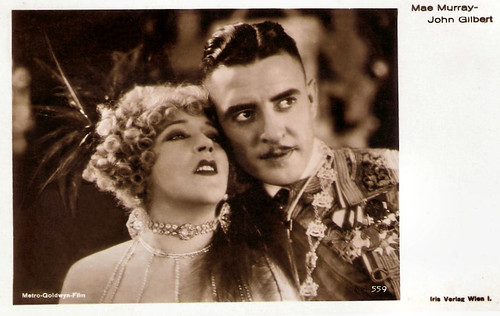
Mae Murray and John Gilbert in The Merry Widow. Austrian postcard by Iris Verlag, no. 559. Photo: Metro-Goldwyn-Film. Publicity still for The Merry Widow (Erich von Stroheim, 1925).
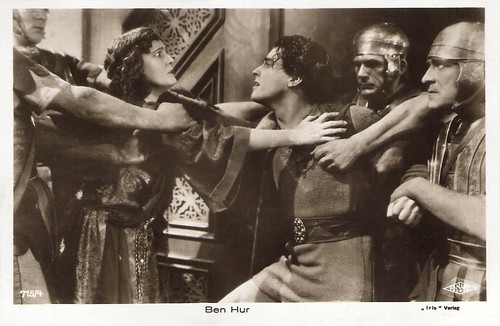
Ramon Novarro and Claire McDowell in Ben-Hur. Austrian postcard by Iris Verlag, no. 715/4. Photo: MGM. Publicity still for Ben-Hur: A Tale of the Christ (Fred Niblo, 1925).
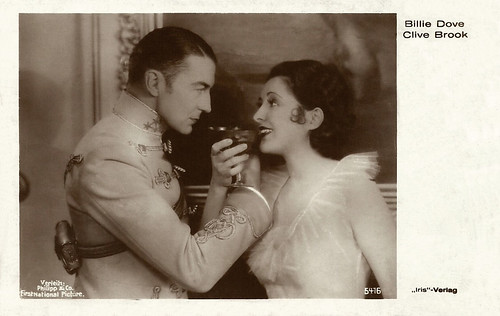
Clive Brook and Billie Dove in Yellow Lily. Austrian postcard by Iris Verlag, no. 5416. Photo: Verleih Philipp & Co. / First National. Publicity still for Yellow Lily (Alexander Korda, 1928).
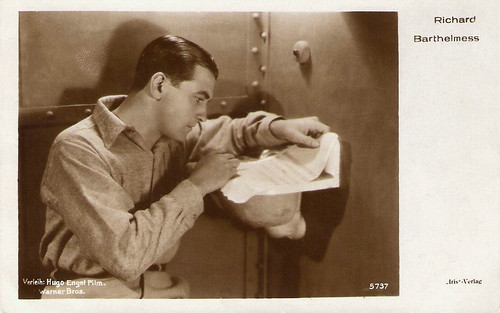
Richard Barthelmess. Austrian postcard by Iris Verlag, no. 5737. Photo: Hugo Engel Film / Warner Bros.
A big difference between Ross Verlag and Iris-Verlag is the fact that Iris was just producing one special postcard format (14 x 9 cm). Iris didn't publish any scene cards in a series like Ross did or any luxury cards, art sheets or miniature cards.
Early Iris cards came out in a sepia brown tone. A few years later, at the beginning of the 1930s, the production of all following cards was handled in another quality which reminded more of a black/white motive.
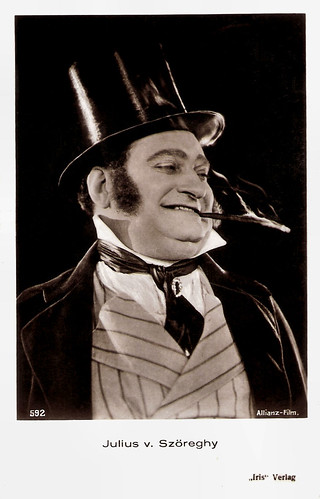
Julius von Szöreghy. Austrian postcard by Iris Verlag, no. 592. Photo: Allianz Film.
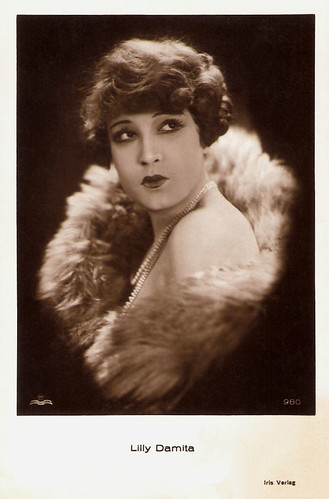
Lily Damita. Austrian postcard by Iris Verlag, no. 980. Photo: Sascha-Film.

Jack Trevor. Austrian postcard by Iris-Verlag, no. 5006. Photo: Sascha.
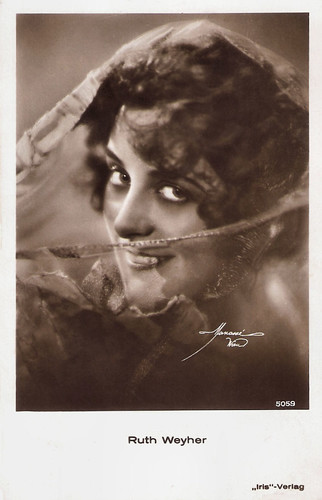
Ruth Weyher. Austrian postcard by Iris Verlag, no. 5059. Photo: Manassé, Wien.

Ita Rina. Austrian postcard by Iris-Verlag, no. 5118. Photo: Kiesel, Berlin.
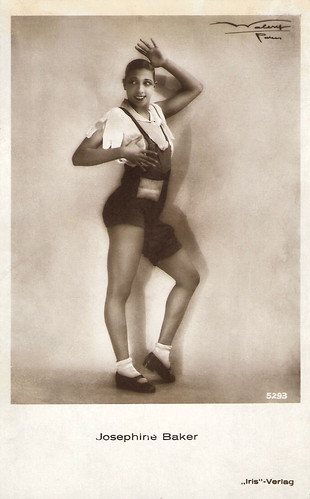
Josephine Baker. Austrian postcard by Iris Verlag, no. 5293. Photo: Walery, Paris.
Iris-Verlag published its cards in vertical and in horizontal formats. The listing of the different card numbers is a little bit uncommon. You can see the numbers on the lower left card edge or the right one or even within the photograph itself on the left or right side.
To make the confusion complete, Iris placed the numbers even on the reverse side of the cards, beginning from number 5954 till the end of the whole production. From that number on you can also see the addition 'Amag' above 'Iris' and the individual card number.
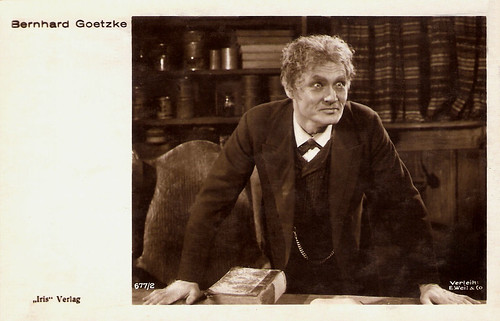
Bernhard Goetzke. Austrian postcard by Iris Verlag, no. 677/2. Photo: Verleih E. Weil & Co.
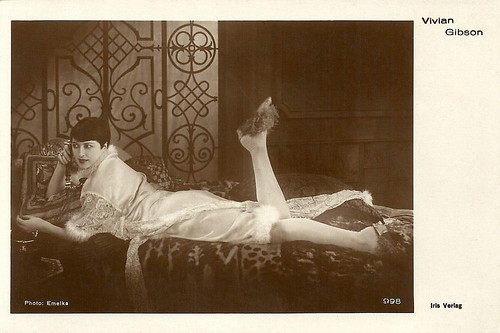
Vivian Gibson. Austrian postcard by Iris Verlag, no. 998. Photo: Emelka.

Elisabeth Bergner. Austrian postcard by Iris Verlag, no. 5689. Photo: Poetic Film / Lux-Film Verleih.
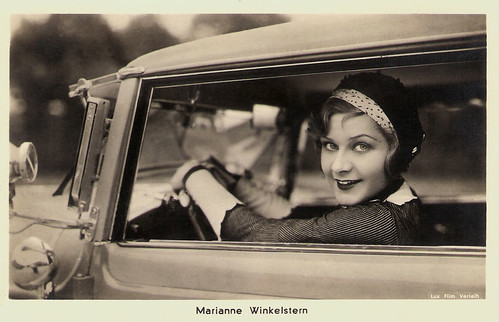
Marianne Winkelstern. Austrian postcard by Iris, no. 6514. Photo: Lux Film Verleih.
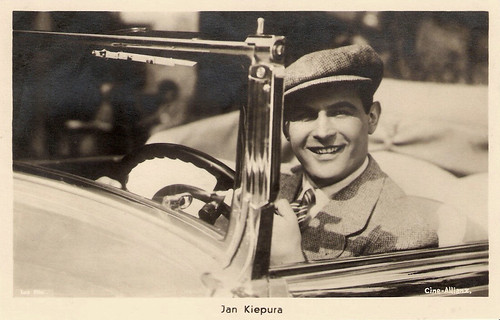
Jan Kiepura. Austrian Postcard by Iris Verlag. Photo: Lux Film / Cine-Allianz. Still from Das Lied einer Nacht (Anatole Litvak, 1932).
On the front side of the cards you can always read the name of the pictured persons and the origin where the photograph does come from. A copyright index is not given.
In the same manner as Ross Verlag did, Iris-Verlag produced some colorized cards as well. The handling was similar to Ross.
This was all the info we could find at the net, thanks to these enthusiastic contributors of the wonderful site Garbo Forever. Do you know more? Please share!

Emil Jannings. Austrian postcard by Iris Verlag, no. 970. Photo: Verleih Philipp & Co.
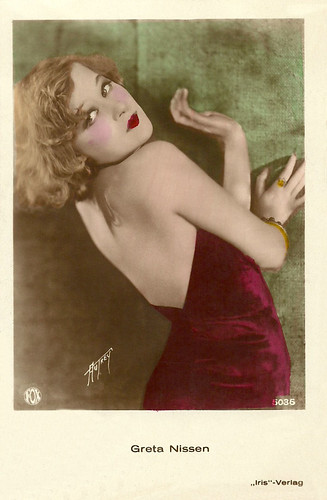
Greta Nissen. German postcard by Iris Verlag, no. 5035. Photo: Autrey / Fox.

Jaque Catelain. Austrian postcard by Iris Verlag, no. 824. Photo: Isabey, Paris.
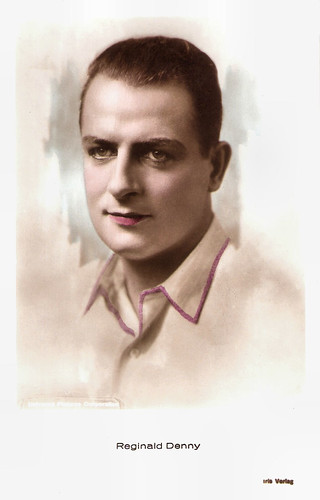
Reginald Denny. Austrian postcard by Iris Verlag.
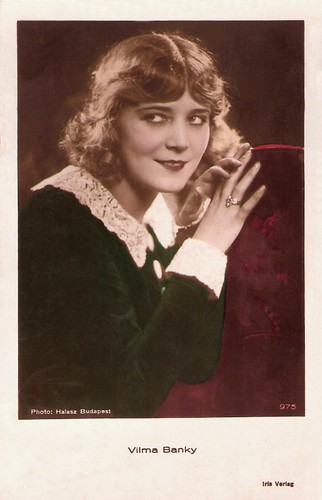
Vilma Banky. Austrian postcard by Iris Verlag, no. 975. Photo: Halasz, Budapest.
This was the second post in a new series on film star postcard publishers. For earlier posts, see the links at right under the caption 'The Publishers'. Next Wednesday: the British phenomenon of Picturegoer.
Source: Garbo Forever. See also our Iris-Verlag album at Flickr.

Mae Murray and John Gilbert in The Merry Widow. Austrian postcard by Iris Verlag, no. 559. Photo: Metro-Goldwyn-Film. Publicity still for The Merry Widow (Erich von Stroheim, 1925).

Ramon Novarro and Claire McDowell in Ben-Hur. Austrian postcard by Iris Verlag, no. 715/4. Photo: MGM. Publicity still for Ben-Hur: A Tale of the Christ (Fred Niblo, 1925).

Clive Brook and Billie Dove in Yellow Lily. Austrian postcard by Iris Verlag, no. 5416. Photo: Verleih Philipp & Co. / First National. Publicity still for Yellow Lily (Alexander Korda, 1928).

Richard Barthelmess. Austrian postcard by Iris Verlag, no. 5737. Photo: Hugo Engel Film / Warner Bros.
Sepia
A big difference between Ross Verlag and Iris-Verlag is the fact that Iris was just producing one special postcard format (14 x 9 cm). Iris didn't publish any scene cards in a series like Ross did or any luxury cards, art sheets or miniature cards.
Early Iris cards came out in a sepia brown tone. A few years later, at the beginning of the 1930s, the production of all following cards was handled in another quality which reminded more of a black/white motive.

Julius von Szöreghy. Austrian postcard by Iris Verlag, no. 592. Photo: Allianz Film.

Lily Damita. Austrian postcard by Iris Verlag, no. 980. Photo: Sascha-Film.

Jack Trevor. Austrian postcard by Iris-Verlag, no. 5006. Photo: Sascha.

Ruth Weyher. Austrian postcard by Iris Verlag, no. 5059. Photo: Manassé, Wien.

Ita Rina. Austrian postcard by Iris-Verlag, no. 5118. Photo: Kiesel, Berlin.

Josephine Baker. Austrian postcard by Iris Verlag, no. 5293. Photo: Walery, Paris.
Confusion
Iris-Verlag published its cards in vertical and in horizontal formats. The listing of the different card numbers is a little bit uncommon. You can see the numbers on the lower left card edge or the right one or even within the photograph itself on the left or right side.
To make the confusion complete, Iris placed the numbers even on the reverse side of the cards, beginning from number 5954 till the end of the whole production. From that number on you can also see the addition 'Amag' above 'Iris' and the individual card number.

Bernhard Goetzke. Austrian postcard by Iris Verlag, no. 677/2. Photo: Verleih E. Weil & Co.

Vivian Gibson. Austrian postcard by Iris Verlag, no. 998. Photo: Emelka.

Elisabeth Bergner. Austrian postcard by Iris Verlag, no. 5689. Photo: Poetic Film / Lux-Film Verleih.

Marianne Winkelstern. Austrian postcard by Iris, no. 6514. Photo: Lux Film Verleih.

Jan Kiepura. Austrian Postcard by Iris Verlag. Photo: Lux Film / Cine-Allianz. Still from Das Lied einer Nacht (Anatole Litvak, 1932).
Colorized Cards
On the front side of the cards you can always read the name of the pictured persons and the origin where the photograph does come from. A copyright index is not given.
In the same manner as Ross Verlag did, Iris-Verlag produced some colorized cards as well. The handling was similar to Ross.
This was all the info we could find at the net, thanks to these enthusiastic contributors of the wonderful site Garbo Forever. Do you know more? Please share!

Emil Jannings. Austrian postcard by Iris Verlag, no. 970. Photo: Verleih Philipp & Co.

Greta Nissen. German postcard by Iris Verlag, no. 5035. Photo: Autrey / Fox.

Jaque Catelain. Austrian postcard by Iris Verlag, no. 824. Photo: Isabey, Paris.

Reginald Denny. Austrian postcard by Iris Verlag.

Vilma Banky. Austrian postcard by Iris Verlag, no. 975. Photo: Halasz, Budapest.
This was the second post in a new series on film star postcard publishers. For earlier posts, see the links at right under the caption 'The Publishers'. Next Wednesday: the British phenomenon of Picturegoer.
Source: Garbo Forever. See also our Iris-Verlag album at Flickr.
2 comments:
Hallo, IRIS Card 5661 is showing Aribert Mog, not Lars Hanson.
Regards Werner Mohr
Thanks, Werner! You´re right. We´ve changed it at Flickr.
Post a Comment